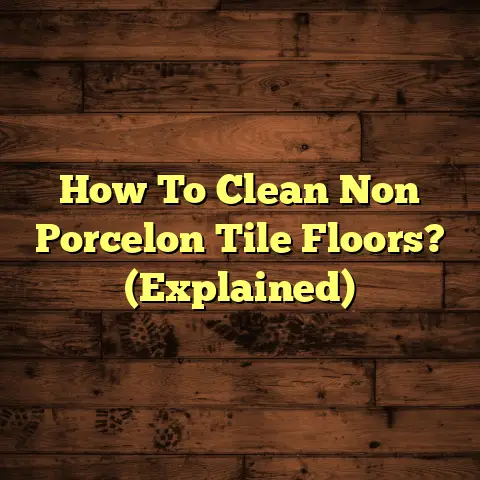Epoxy Flooring Cost Per Square Metre In India (Explained)
Epoxy flooring is a popular choice for both residential and commercial spaces due to its durability, aesthetic appeal, and ease of maintenance. However, understanding the cost structure associated with epoxy flooring installation is crucial for planning your project effectively. This article will provide an in-depth analysis of the factors influencing epoxy flooring costs per square metre in India.
Overview of Cost Factors
When estimating the cost of epoxy flooring, several key factors come into play:
1. Area Size
The total area to be covered significantly impacts the overall cost. Larger areas may benefit from economies of scale, resulting in a lower cost per square metre.
2. Type of Epoxy
There are various types of epoxy flooring systems available, including:
- Self-Leveling Epoxy: Ideal for creating a smooth surface.
- Epoxy Mortar: Suitable for heavy-duty environments.
- Flake Epoxy: Provides a decorative finish with added texture.
- Metallic Epoxy: Offers a unique, high-gloss appearance.
Each type has its price range, impacting the overall project cost.
3. Labour Costs
Labour rates can vary based on location, expertise, and project complexity. Skilled professionals may charge more, but their experience can lead to a better finish and longevity.
4. Preparation and Additional Costs
Preparation work is essential for successful epoxy flooring installation. This may involve:
- Floor Removal: If existing flooring needs to be removed, this will add to the cost.
- Subfloor Repairs or Replacement: Ensuring a solid base is crucial for durability.
- Surface Preparation: Cleaning, grinding, and repairing the existing surface are necessary steps.
5. Material Quality
The quality of the epoxy resin and additives used can greatly influence costs. Higher-quality materials typically provide better durability and finish.
6. Room Layout and Design
Complex room shapes or custom designs may require more time and effort to install, leading to increased costs.
Detailed Cost Breakdown
Here’s a detailed breakdown of potential costs associated with epoxy flooring in India:
| Cost Component | Price Range (INR per sq. metre) |
|---|---|
| Basic Epoxy Flooring | 300 – 600 |
| Self-Leveling Epoxy | 600 – 1,200 |
| Flake Epoxy | 800 – 1,500 |
| Metallic Epoxy | 1,200 – 2,000 |
| Labour Costs | 100 – 300 |
| Floor Removal (if applicable) | 30 – 100 |
| Subfloor Repairs | 50 – 150 |
Example Costs for Different Project Sizes
- Small Area (20 sq. m):
- Basic Epoxy: ₹6,000 – ₹12,000
- Self-Leveling: ₹12,000 – ₹24,000
- Medium Area (50 sq. m):
- Basic Epoxy: ₹15,000 – ₹30,000
- Self-Leveling: ₹30,000 – ₹60,000
- Large Area (100 sq. m):
- Basic Epoxy: ₹30,000 – ₹60,000
- Self-Leveling: ₹60,000 – ₹120,000
Comparison with Alternative Flooring Options
When considering epoxy flooring, it’s helpful to compare it with other flooring options available in India:
| Flooring Type | Cost Range (INR per sq. metre) | Durability | Maintenance |
|---|---|---|---|
| Epoxy | 300 – 2,000 | High | Low |
| Laminate | 200 – 800 | Moderate | Moderate |
| Vinyl | 150 – 600 | Moderate | Low |
| Carpet | 250 – 1,000 | Low | High |
While epoxy flooring can have a higher upfront cost compared to laminate or vinyl, its longevity and durability often make it a more cost-effective option over time.
Signs Your Epoxy Floor Needs Replacement
Over time, even the best-installed epoxy floors may show signs of wear or damage. Here are key indicators that replacement might be necessary:
- Cracking or Peeling: Significant cracks or peeling sections indicate underlying issues that may not be repairable.
- Discoloration: Persistent stains or fading can compromise aesthetic value.
- Dull Appearance: If polishing or refinishing fails to restore shine, it may be time for replacement.
Refinishing vs. Replacement
Deciding whether to refinish or replace your epoxy floor involves several considerations:
- Condition of Existing Floor: Minor scratches can often be repaired, while extensive damage may necessitate replacement.
- Cost Effectiveness: Compare the costs of refinishing against full replacement to determine the best option.
- Desired Aesthetic: If a complete change in look is desired, replacement might be the way to go.
Pros and Cons of Epoxy Flooring
Pros
- Durability: Resistant to wear and tear, making it ideal for high-traffic areas.
- Easy Maintenance: Simple cleaning routines can keep it looking new.
- Aesthetic Appeal: Wide variety of colors and finishes available.
Cons
- Installation Complexity: Requires skilled labour for proper application.
- Temperature Sensitivity: May not perform well in extreme temperatures.
- Initial Cost: Higher upfront investment compared to some alternatives.
Professional Installation vs. DIY
Choosing between professional installation and a DIY approach involves weighing the pros and cons:
Professional Installation
- Cost: Higher due to labour charges (₹100 – ₹300 per sq. metre).
- Expertise: Ensures a high-quality finish that meets industry standards.
- Tools Required: Professionals have access to specialized tools that may not be available for DIYers.
DIY Installation
- Cost Savings: Potentially lower costs if you have the skills and tools.
- Time Investment: Can be time-consuming and requires significant effort.
- Skill Level: Proper installation requires knowledge of techniques that may be beyond a novice’s capability.
Questions to Ask Hardwood Flooring Contractors
Before hiring a contractor for your epoxy flooring project, consider asking the following questions:
- What is your experience with epoxy flooring installations?
- Can you provide references from previous clients?
- What type of epoxy do you recommend for my project?
- How will you prepare the surface before installation?
- What is your warranty policy on materials and workmanship?
Care and Maintenance Tips for Longevity
To maximise the lifespan of your epoxy floor, consider these care tips:
- Regular Cleaning: Use a damp mop with mild detergent to clean surfaces regularly.
- Avoid Harsh Chemicals: Steer clear of abrasive cleaners that can damage the finish.
- Protect from Heavy Objects: Use pads under furniture legs to prevent scratches and dents.
- Address Spills Promptly: Clean up spills immediately to prevent staining.
Conclusion
Understanding the cost structure and various factors involved in epoxy flooring installation in India is essential for making informed decisions. By considering area size, material quality, labour costs, and preparation requirements, you can estimate your total project cost accurately. Whether opting for professional installation or considering a DIY approach, having the right information will help ensure your epoxy flooring project is a success.
With proper care and maintenance, epoxy floors can provide a durable and attractive surface that enhances any space for years to come.





